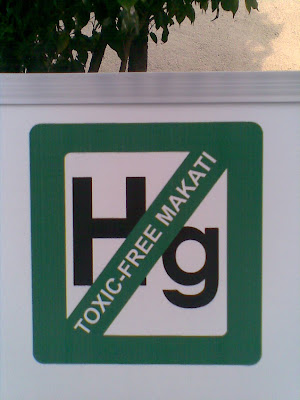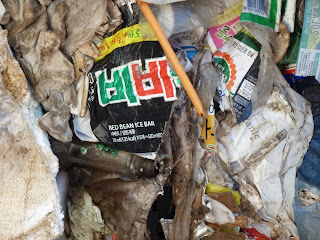Makati City Urged to Widen Mercury-Free Drive


 (Photos by Manny Calonzo)
(Photos by Manny Calonzo)An environmental watchdog has commended the government of Makati City for its pioneering initiative to make the country’s premier business and financial capital “mercury-free.”
“Makati’s effort to raise public awareness about the need for environmentally-sound management of mercury-containing lamp waste is a feat worth replicating by other local government units,” said Thony Dizon, Coordinator of the EcoWaste Coalition’s Project Protect.
“We urge the Makati authorities to expand and sustain this beneficial program beyond the June to September 2011 timeframe to make it truly effective,” he said.
“We also hope to see Makati introducing more trailblazing measures to keep the city’s homes, schools, businesses, clinics and hospitals free from mercury hazards,” he suggested.
Makati City, in partnership with Zuelling Building, has so far collected 1.58 tons of discarded lamps and batteries that were deposited in custom-built recycling bins located at the Makati City Hall in Barangay Poblacion, Zuellig Building in Makati Avenue corner Paseo de Roxas and in the Barangay Urdaneta office.
The spent lamps are then sent to a government-accredited treatment, storage and disposal facility located in Marilao, Bulacan for proper resource recycling.
To make the program more accessible to Makati’s nearly 600,000 residents, the EcoWaste Coalition has requested Mayor Jejomar Erwin Binay to install more lamp recycling bins in the city’s 33 barangays.
“Apart from the barangay halls, we suggest putting secured lamp recycling bins in other places frequented by the public such as in churches, markets and schools,” Dizon stated.
“It will surely help if the City Council will pass the first-ever ordinance establishing a system for environmentally-sound management of mercury-containing lamp waste to prevent mercury contamination of regular trash,” he pointed out.
“Such a system would necessitate, among other essentials, a sustained public information drive, the integration of the city’s informal recyclers such as the waste pickers into the scheme and the imposition of fines and penalties for improper lamp waste disposal,” he added.
To make Makati City “mercury-free,” the EcoWaste Coalition urged Mayor Binay to seriously consider instituting other practical measures to curb mercury releases, particularly from intentional sources such as mercury in laboratories and schools, in cosmetics and in medical devices.
Specifically, these measures would include:
1. Ordering schools to remove and discontinue use of mercury compounds and mercury-containing equipment to prevent chemical spills;
2. Directing regular market surveillance to rid shops of banned personal care products such as mercury-tainted skin whitening creams; and
3. Auditing hospitals and clinics to check their compliance with the phase-out and storage of mercury in health care facilities.
“Makati City, we further hope, can push the government into adopting and enforcing effective national mercury control laws and regulations, as well as support the ongoing process for a comprehensive and robust global mercury treaty,” the EcoWaste Coalition emphasized.
Exposure to mercury, a heavy metal with chemical symbol “Hg,” can cause significant adverse health effects.
According to the United Nations Environment Program and the World Health Organization, “the primary targets for toxicity of mercury and mercury compounds are the nervous system, the kidneys, and the cardiovascular system.”
“Other systems that may be affected include the respiratory, gastrointestinal, hematologic, immune and reproductive systems,” the agencies said.
-end-
“Makati’s effort to raise public awareness about the need for environmentally-sound management of mercury-containing lamp waste is a feat worth replicating by other local government units,” said Thony Dizon, Coordinator of the EcoWaste Coalition’s Project Protect.
“We urge the Makati authorities to expand and sustain this beneficial program beyond the June to September 2011 timeframe to make it truly effective,” he said.
“We also hope to see Makati introducing more trailblazing measures to keep the city’s homes, schools, businesses, clinics and hospitals free from mercury hazards,” he suggested.
Makati City, in partnership with Zuelling Building, has so far collected 1.58 tons of discarded lamps and batteries that were deposited in custom-built recycling bins located at the Makati City Hall in Barangay Poblacion, Zuellig Building in Makati Avenue corner Paseo de Roxas and in the Barangay Urdaneta office.
The spent lamps are then sent to a government-accredited treatment, storage and disposal facility located in Marilao, Bulacan for proper resource recycling.
To make the program more accessible to Makati’s nearly 600,000 residents, the EcoWaste Coalition has requested Mayor Jejomar Erwin Binay to install more lamp recycling bins in the city’s 33 barangays.
“Apart from the barangay halls, we suggest putting secured lamp recycling bins in other places frequented by the public such as in churches, markets and schools,” Dizon stated.
“It will surely help if the City Council will pass the first-ever ordinance establishing a system for environmentally-sound management of mercury-containing lamp waste to prevent mercury contamination of regular trash,” he pointed out.
“Such a system would necessitate, among other essentials, a sustained public information drive, the integration of the city’s informal recyclers such as the waste pickers into the scheme and the imposition of fines and penalties for improper lamp waste disposal,” he added.
To make Makati City “mercury-free,” the EcoWaste Coalition urged Mayor Binay to seriously consider instituting other practical measures to curb mercury releases, particularly from intentional sources such as mercury in laboratories and schools, in cosmetics and in medical devices.
Specifically, these measures would include:
1. Ordering schools to remove and discontinue use of mercury compounds and mercury-containing equipment to prevent chemical spills;
2. Directing regular market surveillance to rid shops of banned personal care products such as mercury-tainted skin whitening creams; and
3. Auditing hospitals and clinics to check their compliance with the phase-out and storage of mercury in health care facilities.
“Makati City, we further hope, can push the government into adopting and enforcing effective national mercury control laws and regulations, as well as support the ongoing process for a comprehensive and robust global mercury treaty,” the EcoWaste Coalition emphasized.
Exposure to mercury, a heavy metal with chemical symbol “Hg,” can cause significant adverse health effects.
According to the United Nations Environment Program and the World Health Organization, “the primary targets for toxicity of mercury and mercury compounds are the nervous system, the kidneys, and the cardiovascular system.”
“Other systems that may be affected include the respiratory, gastrointestinal, hematologic, immune and reproductive systems,” the agencies said.
-end-




Comments